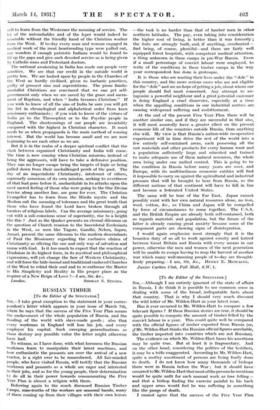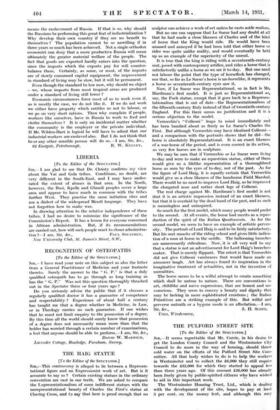[To the Editor of the SPECTATOR.]
SIR,—Although I am entirely ignorant of the state of affairs in Russia, I do think it is possible to use common sense in dealing with some of the broad, indisputable facts about that country. That is why I should very much discount the wild letter of Mr. Wilden-Hart in your latest issue.
Has it ever occurred to Mr. Wilden-Hart to compare a few relevant figures ? If these Russian stories are true, it should be quite possible to compute the amount of timber felled by the convict labour in a year. This could quite well be compared with the official figures of timber exported from Russia (or, if Mr. Wilden-Hart thinks the Russian official figures unreliable, the timber imported into countries which are not Russian).
The evidence on which Mr. Wilden-Hart bases his assertions may be quite true. But at least it is fragmentary. And on the other hand, considering the politics of the testifiers, it may be a trifle-exaggerated. According to Mr. Wilden-Hart, quite a motley assortment of persons are being foully done to death. I do not know how many thousands of bishops there were in Russia before the War ; but it should have occurred to Mr. Wilden-Hart that most of the persons he mentions would be quite unfit for such manual work as tree felling-- and that a bishop finding the exercise painful to his back and upper arms would feel he was suffering in something
like the pangs of-death. - I cannot agree that the success of the Five Year Plan
means the enslavement of Russia. If that is so, why should the Russians be performing this great feat of industrialization ? Why develop their own country if they see no benefit to themselves ? The population cannot be so unwilling if in three years so much has been achieved. Not a single orthodox economist can deny that a more productive. Russia will mean ultimately the greater material welfare of the people. The fact that goods are exported hardly enters into the question, since the imports which the exports pay for will counter- balance them. Certainly, as some, or most, of the imports are of slowly consumed capital equipment, the improvement in standard of living may be slow, but it will be permanent.
Even though the standard be low now, why should we object —we, whose imports from most tropical areas are produced under a standard of living still lower ?
Economic circumstances force most of us to work even if, as is mostly the case, we do not like it. If we do not work we either have property which entitles us not to labour, or we go on very short rations. Then why complain if people, workers like ourselves, have in Russia to work to feed and clothe themselves ? It is only an incidental matter whether the community is the employer or the private individual., If Mr. Wilden-Hart is logical he will have to admit that our industrial workers are enslaved also. But I do not think that he or any other sensible person will do so.—I am, Sir, &c.,
























































 Previous page
Previous page